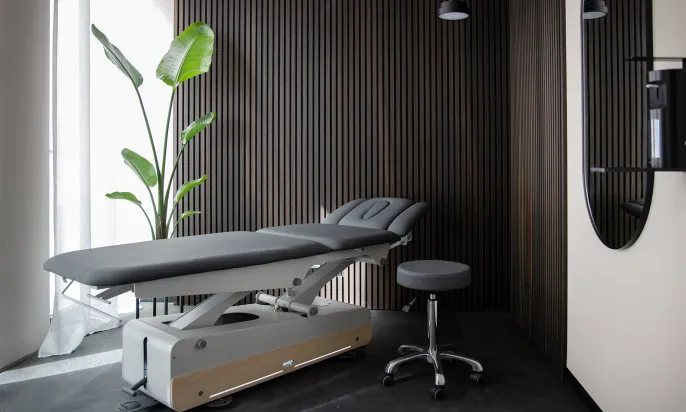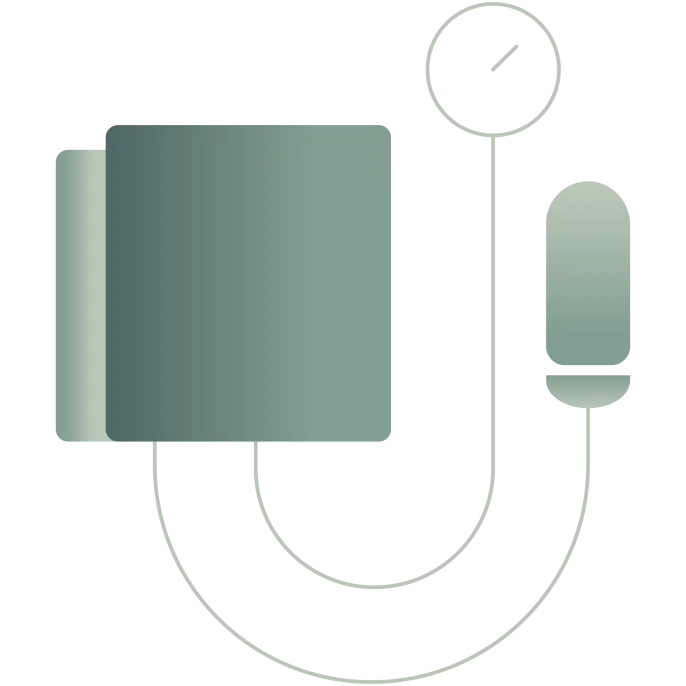Hypertensiology
What does hypertensiology mean?
The term “hypertensiologist” is used for doctors who specialize in the treatment of high blood pressure (hypertension) and associated health disorders. These disorders are among the most common and potentially most dangerous health disorders. Undetected high blood pressure is also known as the “silent killer” because it often shows no symptoms and is therefore difficult to detect.
What does a hypertensiologist do?
Blood pressure specialists specialize in the diagnosis, treatment and management of high blood pressure and related disorders.
Their responsibilities include:
Conducting extensive patient examinations
Diagnosing high blood pressure and determining its causes
Developing and implementing treatment plans
Monitoring and adjusting treatment
Educating patients about lifestyle changes and medication adherence
What is high blood pressure (hypertension)?
High blood pressure is one of the most common diseases worldwide. In Germany, an estimated 18 to 35 million people suffer from high blood pressure. Half of the population over 60 years of age is affected.
Blood pressure of 120/80 mmHg (millimeters of mercury) is considered optimal. An increase in blood pressure to 140/90 mm Hg or more is considered high blood pressure.
High blood pressure is the most important risk factor for stroke. However, it can not only damage the brain, but also the heart, kidneys, eyes and other blood vessels.
Which specialist is entitled to use the additional title of “hypertensiologist”?
Blood pressure specialists are usually internists, cardiologists or nephrologists who have additionally specialized in high blood pressure. In addition to their basic medical training, they must be certified by the German Hypertension League (DHL), for which they must meet certain criteria and pass an examination. A hypertensiologist is obliged to get re-certified every year in order to be up-to-date in the treatment of arterial hypertension.
Dr. Konstantinou is a designated specialist in the treatment of high blood pressure (hypertensiologist) and a member of the German Hypertension League (http://www.hochdruckliga.de/).
What conditions does a hypertensiologist treat?
Primary high blood pressure
also known as essential hypertension, is the most common form of high blood pressure and has no identifiable cause. It develops gradually over many years.
Secondary high blood pressure
Secondary hypertension is caused by an underlying condition, such as kidney disease, hormonal disorders or certain medications. Specialists are able to identify and treat these underlying causes.
Hypertensive crises
A hypertensive crisis is a sharp increase in blood pressure that can lead to a stroke, heart attack or other serious complications. Immediate intervention by a specialist is crucial.
White coat hypertension
Some people experience elevated blood pressure in a clinical setting but not in other settings. Specialists can distinguish between white coat hypertension and true hypertension, ensuring appropriate treatment.
Masked hypertension
is when a patient has normal blood pressure levels in a clinical setting but high levels in other settings. Specialists use 24-hour blood pressure monitoring to diagnose and treat this condition.
What are the stages of hypertension?
Arterial hypertension is classified into several stages:
Optimal: Less than 120/80 mmHg
Normal: Systolic between 120-129 mmHg and diastolic less than 80 mmHg
High normal: Systolic between 130-139 mmHg or diastolic between 85-89 mmHg
Hypertension stage I° (mild): systolic between 140-159 mmHg or diastolic 90-99 mmHg
Hypertension stage II° (moderate): systolic between 160-179 mmHg or diastolic 100-109 mmHg
Hypertension stage III (severe): systolic over 178 mmHg or diastolic over 110 mmHg, requiring immediate medical attention.
Isolated systolic hypertension. Systolic over 140 mmHg and diastolic under 90 mmHg.

What can you expect on your first visit to our hypertension consultation?
As part of the medical history, your personal data is first recorded.
The examination of lifestyle and family is also part of the diagnostic process. A health check with blood pressure measurement and examination of the organs relevant to blood pressure is mandatory to clarify possible causes and consequences of high blood pressure. In addition, laboratory tests of blood and urine are carried out to rule out other risk factors.
Further services are offered by us for diagnostics and therapy:
electrocardiography (ECG)
bicycle ergometry test to detect hidden high blood pressure (stress-induced hypertension)
long-term blood pressure measurement over 24 hours
evaluation of protocols for self-measurement of blood pressure in everyday life (important for stress-related high blood pressure)
measurement of the ankle-brachial index (ABI) as an indicator of arterial occlusive diseases
Ultrasound examination of the kidneys, blood vessels and heart
Advice on improving lifestyle habits (exercise, nutrition, stress)
Advice on medication (there are many good medications, but they must be suitable for the patient and their high blood pressure)
Do you need a referral for a consultation with one of our medical experts?
Generally not. However, some health insurance funds may require you to have a referral from your GP. Talk to us about your insurance plan so that the rules of your insurance company can be followed. This way, you can save money and avoid unpleasant surprises.
How can we help lower your blood pressure?
Lifestyle changes
Lifestyle changes are the first line of treatment for high blood pressure and include:
Nutrition: Emphasis on a heart-healthy diet, such as the DASH (Dietary Approaches to Stop Hypertension) diet, which is high in fruits, vegetables, whole grains, and low-fat dairy.
Exercise: Encouraging regular physical activity, such as 150 minutes of moderate-intensity aerobic exercise per week, and performing isometric exercises daily.
Weight management: Achieving and maintaining a healthy weight.
Alcohol consumption: Limiting alcohol consumption.
Quitting smoking: Quitting smoking to improve overall cardiovascular health.
Stress management: techniques such as mindfulness, meditation, and yoga.
Drug therapy
When lifestyle changes are insufficient, medications are often required. Hypertension specialists prescribe and administer several classes of antihypertensive medications, including:
Diuretics: They help the kidneys excrete sodium and water, thereby lowering blood pressure.
Beta-blockers: Decrease the heart rate and the force of heart contractions.
ACE inhibitors: Relax blood vessels by blocking the formation of a natural chemical that constricts blood vessels.
Angiotensin II receptor blockers (ARBs): Block the action of the natural chemical that constricts blood vessels.
Calcium channel blockers: Relax the muscles of blood vessels.
Alpha-blockers: Decrease nerve impulses that constrict blood vessels.
Renin inhibitors: Decrease the activity of certain enzymes that increase blood pressure.
Advanced therapies
For resistant hypertension or certain conditions, blood pressure specialists may use advanced therapies, such as:
Renal Denervation: A procedure that uses radiofrequency energy to interrupt the nerves along the renal arteries, which may lower blood pressure.
Baroreceptor Activation Therapy: This involves implanting a device that stimulates the baroreceptors in the carotid arteries to lower blood pressure.
Lifestyle medicine: An integrated approach that includes personalized lifestyle interventions supported by health coaching and technology.
